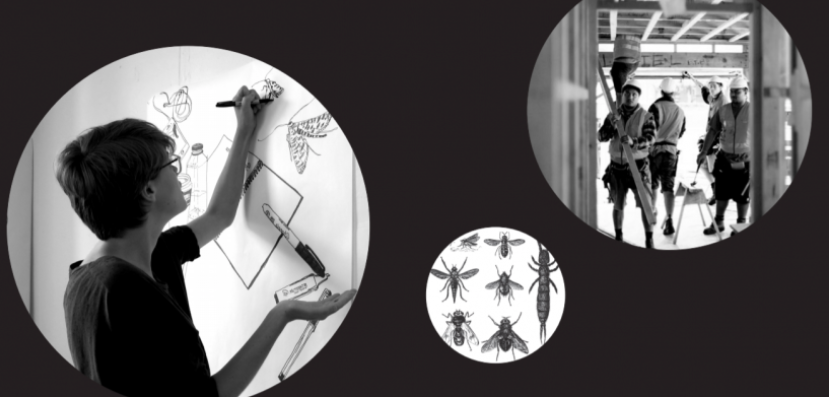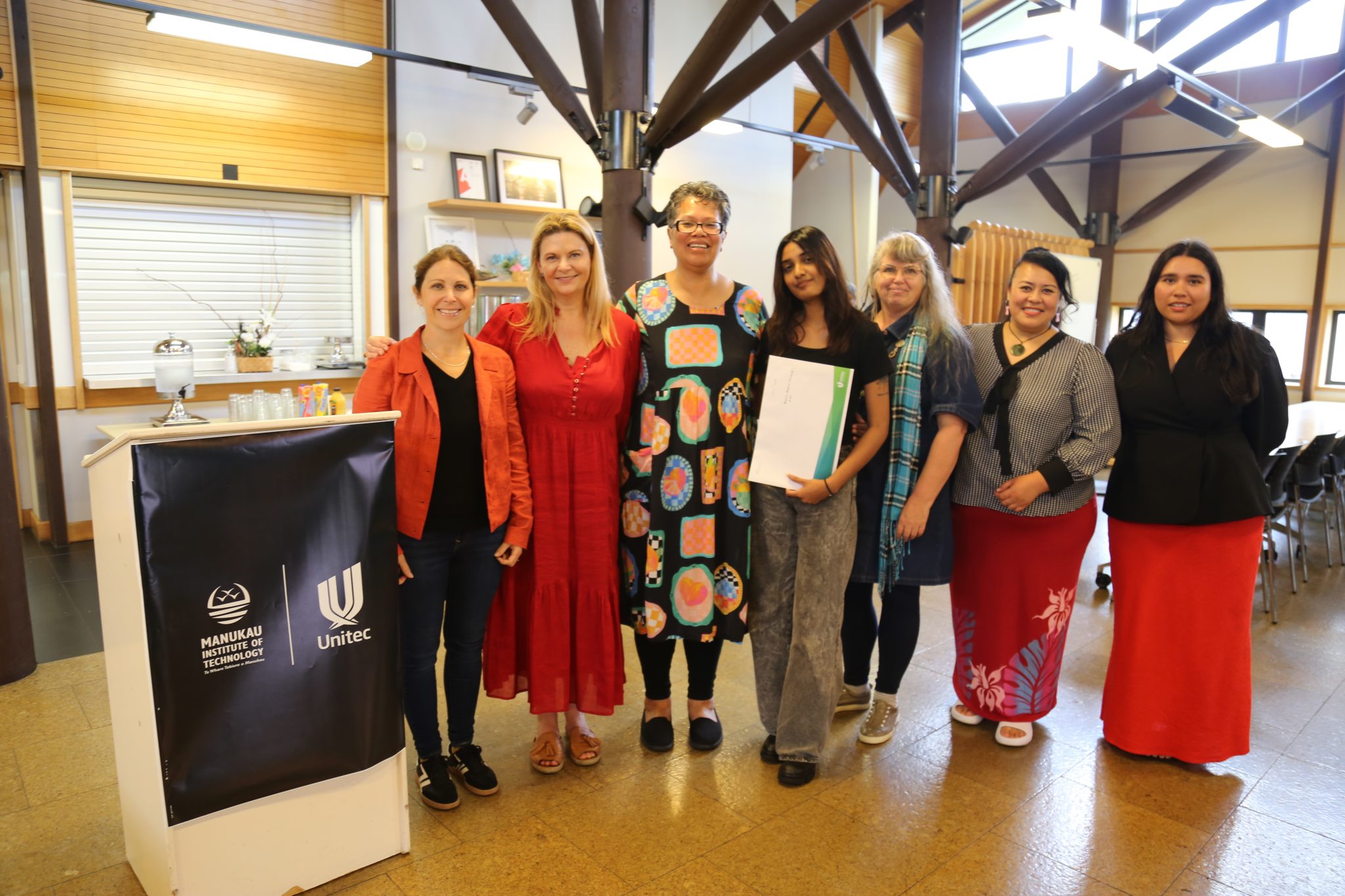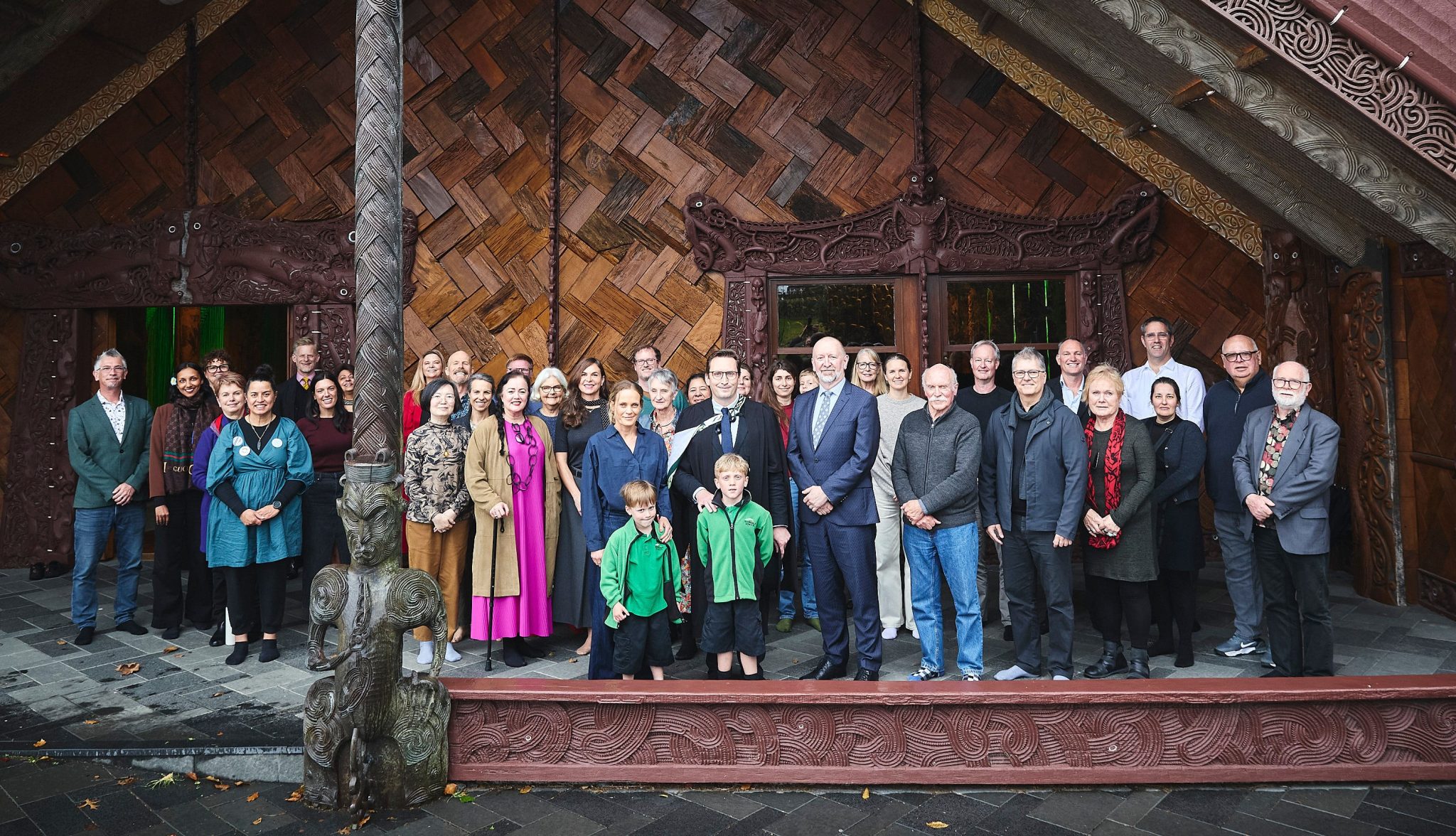There was no shortage of innovative solutions to topical issues at Unitec’s annual Research Symposium, writes coordinator Anusha Bhana.
Using drones to help ecological restoration; reflecting Māori relationships with water in landscape architecture; how applied science can help protect precious islands. These research projects won top honours from a strong field at Unitec’s annual Research Symposium – and all the projects informed, inspired and entertained us.
Organised by Tūāpapa Rangahau: Partnering Research and Enterprise, the symposium took place last week amid a year of significant change for Unitec. The event highlighted the value of what education providers do: creating and sharing knowledge. It’s an invaluable gift that can elicit hope and provide a platform for future-oriented thinking.
The day’s theme, ‘Whaowhia te kete mātauranga’, translates to ‘Fill the basket of knowledge’. And the event began strongly with engaging presentations from two guest speakers. Dion Sheppard, Forensic Research and Development Programme Manager at Environmental Science & Research, clearly highlighted the necessity of industry research partnerships with tertiary providers.
Next, Master of Architecture (Professional) student Reuben Smiler spoke about being a team member of Te Manaaki o te Marae, a project researching how marae across New Zealand can help re-home the homeless based on Te Puea Marae’s amazing success. He demonstrated how tertiary learning can be amplified by participating in real-world, social issues-based industry projects. (Read about this project in the winter 2018 issue of Advance.)
Then we went full steam ahead into a packed programme of student and staff research presentations from a wide range of practice pathways: creative industries, computer science, community development, engineering, healthcare, environmental and animal sciences, and many more. Our staff judges had a tough job on their hands – congratulations to the winners, the finalists and everyone who presented their work on the day.
And the winners were…
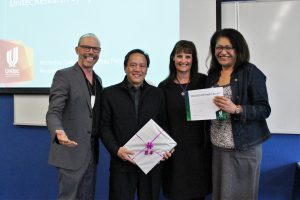
Research with Impact winners Dr Glenn Aguilar (second from left) and Hema Wihongi (far right), with dean Marcus Williams and interim chief executive Merran Davis.
Research with Impact Award
Winners: Dr Glenn Aguilar, Environmental & Animal Sciences, and Hema Wihongi, Māori Science Research: Drone-acquired imagery for characterising ecological restoration areas in Northland. (Read about this project in the summer 2017 issue of Advance.)
Other finalists:
- Geoff Bridgman, Social Practice: “I’ll be happy and smiling all the time” The impact of safety and relational learning for 9-12-year-old children.
- Shannon Wallis, Engineering: The effect of ventilation on volatile organic compounds produced in residential buildings under simulated occupancy. (Read about this project in the summer 2017 issue of Advance.)
- Paula Buckley, Creative Industries: Water drone six-year product design project.
3 Minute Thesis Competition
Postgraduate students had to explain their research to an audience with no knowledge of their discipline, in three minutes or less, using only one PowerPoint slide.
Joint winners:
- Sianne Smith, Master in Architecture: Architecture of perception. Supervisors: Christoph Schnoor & Annabel Pretty.
- Emily Bowerman, Master in Landscape Architecture: Reflecting Māori relationships with water in waterscape planning and landscape architecture. Supervisor: Daniel Irving.
Other finalists:
- Favsta Fernandez, Master in Osteopathy: An exploration of whānau/family perspectives on a mobile application (app) for post-stroke care.
- Xavier Francis, Master in Computing: Predicting wear patterns on footwear outsoles.
- Soheil Varastehpour, Doctorate Computer Science: Vein pattern recognition based on deep learning algorithms for forensic investigation.
- Kashyap Venkatesh Subramany, Master in Computing: Distinguishability of people in an ambient assisted living environment.
Undergraduate Research Competition
Undergraduate students currently involved in research projects explained their work to an audience of staff and students with no knowledge of the discipline in 10 minutes or less.
Winners: Kayla Rench and Phoebe Andrews, Bachelor of Applied Science: Dissemination of biosecurity information and compliance of ferry passengers travelling to selected islands in the Hauraki Gulf. Supervisors: Nigel Adams and Diane Fraser. (See a story about this project in the summer 2017 issue of Advance.)
Runner-up: Zainab Almubarak, Bachelor of Animal Management & Welfare: Attitudes towards cats? A comparison between Saudi Arabia & New Zealand. Supervisors: Nigel Adams & Kris Descovich.
Other finalists:
- Rory Carter, Bachelor of Construction: Analysis of the implementation of modular construction in the New Zealand construction industry.
- Aiona Pamela Suliafu, Bachelor of Teaching (Early Childhood Education): The heart that LISTENS is also HEARD.
- Danyon Robertson, Bachelor of Landscape Architecture: A Martian ecology? The role of ecosystem design in the shaping human habitat on Earth and Mars.
Dean’s Award for significant contribution to the research environment
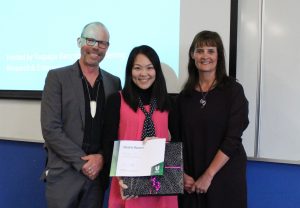
Dean’s Award winner Melanie Ooi with dean Marcus Williams and interim chief executive Merran Davis.
Tūāpapa Rangahau’s dean of research and enterprise, Marcus Williams, granted this annual award to Associate Professor Melanie Ooi, Head of Engineering Practice Pathway. In presenting the award, Williams spoke of Ooi’s diverse experience, from programme development and internationally recognised research to building active research partnerships around New Zealand.
“Melanie’s research is highly specialised, yet flows across disciplines. Her new measurement uncertainty evaluation frameworks apply to a multitude of science and technology areas: medical research, structural design, mechanical systems modelling, and more,” he said.
“She has worked in close collaboration with several leading multinational electronics companies, developing new testing techniques and test data-processing methodologies that have been adopted.
“Melanie has many international awards, numerous research grants, more than 30 journal and 45 conference publications, and current projects with successful postgraduate supervisions under her belt. We’re very lucky to have Melanie at Unitec.”
Expanding minds
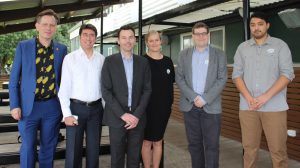
Unitec staff with guest speakers: from left, Christian Probst, Hamid Sharifzadeh, Dion Sheppard, Penny Thomson, Gregor Steinhorn, Reuben Smiler.
By the end of the day, positive vibes filled the room as people made connections and shared ideas. The diversity of topics tackled and innovative solutions buoyed us all, and no doubt inspired others in their own research.
Williams adds, “Hearing from our external guest Dr Dion Sheppard, and Te Manaaki o te Marae researcher Reuben Smiler, reinforced the value of being industry partnered in our research, and to focus our research on areas where we can have a high impact – such as Māori Research, which is our latest Strategic Research Focus.”
After approximately 50 “diverse and outstanding presentations from staff and their students, I felt impressed by the capability of our staff and students. The 2018 symposium was fabulous, and really flies the flag for research at Unitec.”
